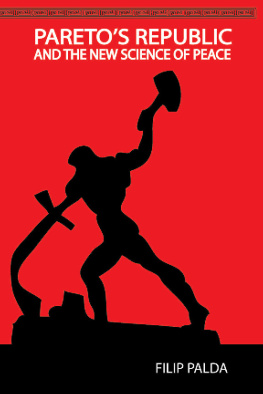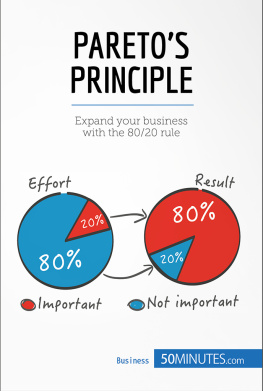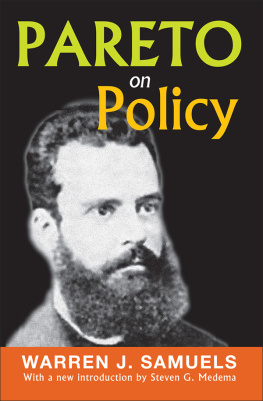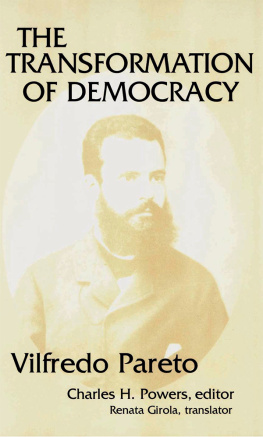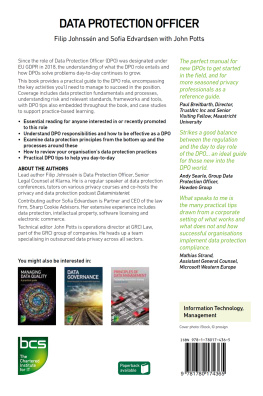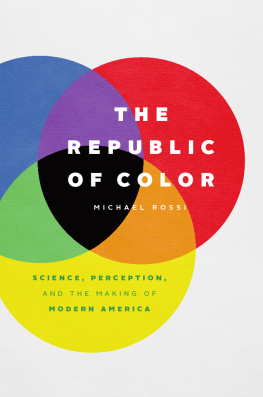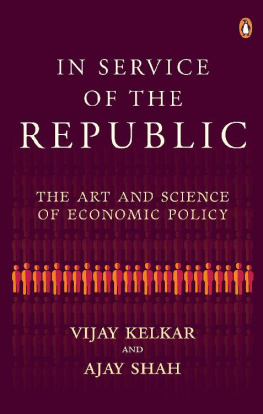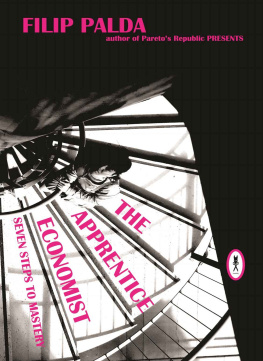K Filip Palda - Paretos republic and the new science of peace
Here you can read online K Filip Palda - Paretos republic and the new science of peace full text of the book (entire story) in english for free. Download pdf and epub, get meaning, cover and reviews about this ebook. City: Montreal, year: 2011, publisher: Cooper-Wolfing, genre: Politics. Description of the work, (preface) as well as reviews are available. Best literature library LitArk.com created for fans of good reading and offers a wide selection of genres:
Romance novel
Science fiction
Adventure
Detective
Science
History
Home and family
Prose
Art
Politics
Computer
Non-fiction
Religion
Business
Children
Humor
Choose a favorite category and find really read worthwhile books. Enjoy immersion in the world of imagination, feel the emotions of the characters or learn something new for yourself, make an fascinating discovery.
- Book:Paretos republic and the new science of peace
- Author:
- Publisher:Cooper-Wolfing
- Genre:
- Year:2011
- City:Montreal
- Rating:3 / 5
- Favourites:Add to favourites
- Your mark:
- 60
- 1
- 2
- 3
- 4
- 5
Paretos republic and the new science of peace: summary, description and annotation
We offer to read an annotation, description, summary or preface (depends on what the author of the book "Paretos republic and the new science of peace" wrote himself). If you haven't found the necessary information about the book — write in the comments, we will try to find it.
Paretos republic and the new science of peace — read online for free the complete book (whole text) full work
Below is the text of the book, divided by pages. System saving the place of the last page read, allows you to conveniently read the book "Paretos republic and the new science of peace" online for free, without having to search again every time where you left off. Put a bookmark, and you can go to the page where you finished reading at any time.
Font size:
Interval:
Bookmark:

Paretos Republic
and the new science of peace
Filip Palda

P UBLISHING INFORMATION
C OPYRIGHT 2011 BY F ILIP P ALDA. All rights reserved. No part of this book may be reproduced in any manner whatsoever without written permission except in the case of brief passages quoted in critical articles and reviews.
Date of issue : December 2011.
Printed and bound in Canada by the Gilmore Press.
Published by Cooper-Wolfling. None of the advisory board of Cooper-Wolfling are responsible for the opinions expressed in this text, which remain the responsibility of the author.

Editor: J. Kristin McCahon
Typesetting and final design supervisor: Lindsey Thomas Martin
Proofreader: Mirja van Herk
Cover design and typesetting: Gibaudrac Studios
About the cover: The cover is an image derived from the Evgeniy Vuchetich sculpture Let Us Beat Swords into Plowshares donated by the Soviet Union to the United Nations in New York in 1959. The derived image is used with the written permission of the legal division of the United Nations.
Palda, Filip, 1962
Paretos Republic / Filip Palda.
Includes bibliographical references.
ISBN 978-0-9877880-0-9
T HIS BOOK IS CERTIFIED TO BE SUBSIDY FREE. N OT ONE DOLLAR
OF TAXPAYER MONEY HAS GONE INTO ITS PRODUCTION.
WWW.PARETOREPUBLIC.COM


About the author
Filip Palda is full professor at the cole nationale dadministration publique. He earned his Ph.D. in economics at the University of Chicago under the supervision of Nobel Prize winner Gary Becker. He is the author of six books, the editor of a further six, and has written hundreds of newspaper and magazine articles as well as over twenty-five articles in refereed academic journals. He is a high-scoring author on the RepEc website of economic working papers and is best known for his work on exposing the self-interest politicians hold in crafting election finance laws and for his role in bringing to light and giving the first full theoretical treatment of the displacement deadweight loss of tax evasion, minimum wage evasion, and rent-seeking.
Dedication
P RO MEMU OTCI.
Acknowledgments
I thank my father Kristian Palda who commented on several drafts of this book. His qualifications are particularly suited to giving feedback on a work of this sort. He received his Ph.D. in business at the University of Chicago under Nobel Prize winning economist George Stigler, and Harry Roberts, the founding statistician of marketing in business. My father then won the Ford Foundation Prize for original dissertations. He discovered the now famous Lydia Pinkham database which allowed him to prove that advertising could have cumulative effects and from this discovery he showed how to measure the value that advertising can contribute to a firm. This and other discoveries made him a leading figure in business economics. Yet he also has a second, very particular qualification, which is that he grew up first under German occupation forces during their reign of terror in Europe and Russia, and after the liberation of his country, Czechoslovakia, was chased from law school, dispossessed of all he owned, and then chased from his country by fellow students-become-collaborator and other home-grown communists acting with the backing of Russian arms. This has given him a unique perspective on conflict, personal separation, corruption, and absolute power, and one which I have drawn upon extensively in writing this book.
I thank Dan Usher for his detailed comments. Professor Usher received his Ph.D. in economics at the University of Chicago and went on to make foundational contributions first to development economics and then to the theory of tax evasion and deadweight loss, including what I believe is the first discussion of displacement deadweight loss. In a burst of creativity he also founded the field of the dynamics of predation in economic systems, which he called dynastic cycles. I believe though that his most enduring contribution to political economy will be his idea that there are economic prerequisites to democracy. The elegance of his analyses is without peer.
I thank Leonard Dudley, a founder along with Claude Montmarquette of the economic analysis of foreign aid, who provided invaluable comments on my views about economic development. Professor Dudley wrote the sort of book which inspired this one. It is called The Pen and The Sword published by Basil Blackwell and is an example of how economic reasoning can rise above economics to become accessible to anyone with the requisite curiosity. Thanks also to Alexandre Couture-Gagnon for her detailed comments.
I thank Kristin McCahon for her invaluable help as editor, proof-reader, and advisor in all matters relating to bringing a book to press. Kristin has for over twenty years been the director of publication production at the Fraser Institute in Vancouver and has been deeply involved in the publishing industry there. Without her patient guidance and brilliant conceptual and detail editing this book simply would not have been possible. Thank you Kristin. Any remaining errors are mine alone! Thanks are also due to Mirja van Herk for final copy-editing and to Lindsey Thomas Martin for supervising the typesetting of this book as well as cover design and dealing with all matters relating to ensuring the manuscript would be fit to send to the printers as well as to Dezso Vaghy for early suggestions on cover design. And finally but not least I thank Jim McIntyre, of the Gilmore Press.
USER GUIDE
This book can be read from start to finish because it has a uniting theme: Pareto efficiency as a recipe for peace. It has also been designed so that you can go to any page and start learning ideas in economics, political science, and Public Choice theory, because everything in this book relates to some important idea in one or all of these fields.
The books main idea
Only a peace that is based on Pareto efficiency, implemented through private property rights, can lead to prosperity and respect for human rights in large societies. What is Pareto efficiency? Some people have heard of something called the Pareto 80-20 rule which says that eighty percent of the profits go to twenty percent of the people. Pareto was a multi-genius, spawning ideas in statistics, sociology, demography, and economics that came to dominate the field. But the 80-20 rule has nothing to do with his notion of efficiency. Pareto efficiency is a much more powerful and subtle concept. A division of resources in society is Pareto-efficient if the pie cannot be re-cut in such a way as to improve the lot of at least one person whilst not making others worse off. This whole book is devoted to exploring this seemingly simple but devastatingly powerful definition of economic efficiency.
Extended summary
A socie TY S tands or falls depending on whether its members feel they are getting as much out of it as they are putting in. Social accounting is the vital ingredient of a successful society; the kind of accounting that creates balance between the efforts people make and the benefits they receive. Societies that get the social accounting right are both rich and peaceful. By peaceful, I mean a condition in which people within those societies cannot arbitrarily coerce each other. If I cannot force others to do something or give me something that I want, I must find another way to convince them to part with something they own, which I can do by offering them something of mine to which they attach a greater value. Persuasion is a viable basis for balanceand peaceful relationsin all human interactions. And to compound the benefits, persuasion is the source of riches. Riches, in this case, means finding new and better ways of using resources, finding new ways to do old things more efficiently. Studies overwhelming support the view that societies based on voluntary consensus are the most prosperous.
Next pageFont size:
Interval:
Bookmark:
Similar books «Paretos republic and the new science of peace»
Look at similar books to Paretos republic and the new science of peace. We have selected literature similar in name and meaning in the hope of providing readers with more options to find new, interesting, not yet read works.
Discussion, reviews of the book Paretos republic and the new science of peace and just readers' own opinions. Leave your comments, write what you think about the work, its meaning or the main characters. Specify what exactly you liked and what you didn't like, and why you think so.

